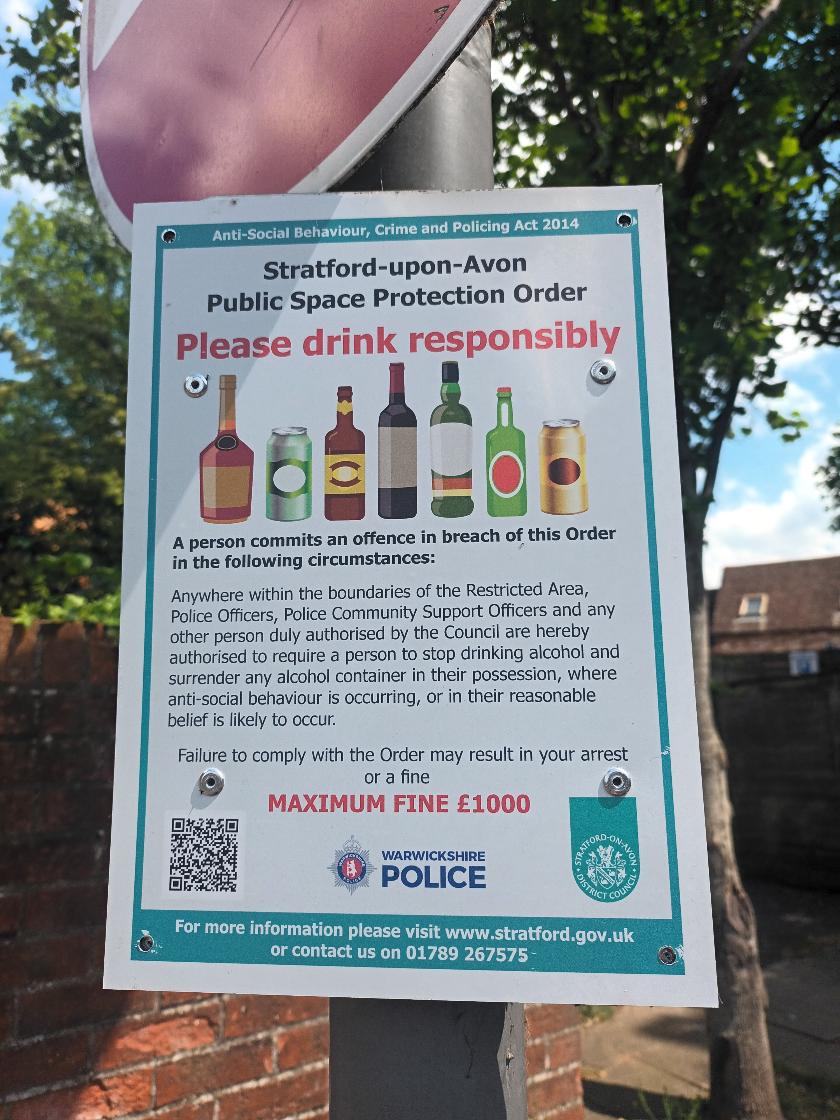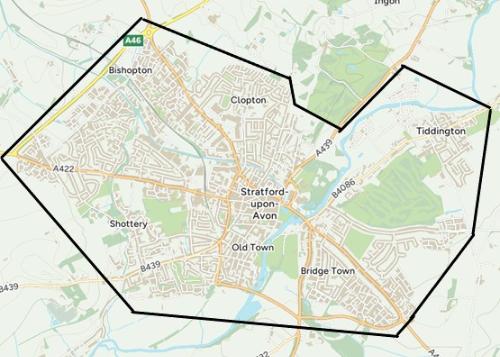During the Christmas period, there will be a change to your refuse collection dates, you can find out when your collection dates will be via our dedicated page Christmas recycling and rubbish collections.
The Anti-Social Behaviour, Crime and Policing Act 2014 introduced Public Space Protection Orders (PSPO's). PSPO's are used to protect the public from behaviour that is having, or is likely to have, a detrimental effect on the quality of life of those in a locality and which is (or is likely to be) of a persistent or continuing nature, and unreasonable. Councils can make PSPO's to prohibit specified activities, and/or to require certain things to be done by people engaged in particular activities, within a defined area.
Stratford-on-Avon District Council works in partnership with many statutory partners, including Warwickshire Police, the Police and Crime Commissioner and local councils, to prevent crime, disorder and anti-social behaviour (ASB). Over the last three years, the Council and Police have received an increasing number of reports from residents regarding alcohol related anti-social behaviour in Stratford-upon-Avon, Warwickshire.
The Council have held discussions with Warwickshire Police regarding the criminal and anti-social behaviour taking place in Stratford-upon-Avon, to look at the best way to tackle it. From these discussions, the Council believes that a PSPO is an appropriate and necessary tool for local agencies to reduce incidents of those listed above.

The PSPO consultation took place between Tuesday 5th March to Wednesday 8th May 2024. 188 responses were received though the consultation that took place online via the Stratford District Council website.
91.6% of responses were in favour of the PSPO, 8.4% were against it.
180 people agreed on a ban on those drinking alcohol and acting in an antisocial manner within the defined area 180 (96.3%) 7 (3.7%)
Anywhere within the boundaries of the Restricted Area, Police Officers, Police Community Support Officers and any other person duly authorised by the Council are hereby authorised to require a person to stop drinking alcohol and surrender any alcohol container in their possession, where anti-social behaviour is occurring, or in their reasonable belief is likely to occur.
The PSPO was approved by Stratford-on-Avon District Council Regulatory Committee on Thursday 5th December and sealed on 30th March 2025.
Please follow link to view the approved order - Sealed Stratford-upon-Avon PSPO
The boundary of PSPO covers Stratford-upon-Avon (see map below for designated area). As part of the consultation, the Council will also take into account the requirements under the Equality Act 2010 and the Human Rights Act 1998. This legislation includes the right to lawful assembly, and the right to freedom of expression.

A person who commits an offence in breach of the PSPO conditions may be given a Fixed Penalty Notice of up to £100 (£50 if paid within 10 days). If a person fails to pay a Fixed Penalty Notice they may be issued with a Court Summons where, upon conviction, the following fines may be incurred: Breach of alcohol restriction up to £500 or Breach of other requirements up to £1,000.
You must pay the Penalty Notice within 14 days of the date of issue. If you pay within 10 days of the date of issue, the penalty notice will be reduced to £50. If you or anyone else choose to pay the penalty within 14 days, no further action will be taken against the person named in respect of the specific offence committed. Payment can be made by credit or debit card by telephoning 01789 260979 quoting your ticket number, or online at www.stratford.gov.uk/payments/
If you fail to pay within 14 days you may be charged with an offence and summoned to appear before a Magistrates' Court to answer charges relating to the offence. The maximum fine upon summary conviction ranges from £500 - £1,000 for Public Spaces Protection Order offences.
No, the aim of the PSPO is to stop anyone who is committing anti-social behaviour through drinking alcohol. If someone is having a glass of wine with a picnic and this is not causing any anti-social behaviour, then they will not be affected by this order.
Events within a public place authorised by a license (or a Temporary Event Notice) will be excluded from the PSPO powers.
The PSPO is not an outright ban on drinking in a public place. It is not an offence to consume alcohol in a public place; the offence is failing to comply with an officer's request to stop drinking or to handover alcohol. Police may engage with you if they believe you are consuming alcohol and causing anti-social behaviour. As a result, they may then make a request to stop drinking or to handover alcohol.
Yes. The PSPO does not make it illegal to drink alcohol in a public place, however, if a person was to drink beyond the legal boundary of a licensed premise and they cause anti-social behaviour and do not stop drinking or hand over alcohol when requested to do so by a police officer or PCSO then they would be committing an offence under the PSPO.
No, the order states that licensed premises are not affected. For full details see the Order on the website.
The conditions of the PSPO will apply all day every day. The PSPO will last for three years and can be extended, amended or discharged following a review.
No. Stratford Safer Neighbourhood Policing Team (SNT) will continue to patrol and respond to incidents as part of their community response. As these powers are in place for any Police Officer or Police Community Support Officer to use there may be key times where more officers patrol the area or operations are run where the power is used.
Yes. The Order prohibits certain specified behaviour and applies to anyone carrying them out.
An authorised person shall be a Police Constable, Police Community Support Officer or a designated Stratford-on-Avon District Council Officer who can enforce the conditions on the order. At present no Stratford-on-Avon District Council officers are delegated as authorised officers.
The main benefits of the PSPO are to help tackle alcohol related anti-social behaviour highlighted in the Order. The condition is aimed at making Stratford-upon-Avon a safer and a more pleasant place to be.
Yes. Signs will be located in and around key public places within the designated area, they will also be placed around key routes into the designated area to signify that there is a PSPO in operation.
The PSPO comprises of the following condition to stop anti-social behaviour (You may wish to refer to the Order on the Council's website for full wording). In summary:
1. Anywhere within the boundaries of the Restricted Area, Police Officers, Police Community Support Officers and any other person duly authorised by the Council are hereby authorised to require a person to stop drinking alcohol and surrender any alcohol container in their possession, where anti-social behaviour is occurring, or in their reasonable belief is likely to occur.
2. This Public Spaces Protection Order is not used to restrict the consumption of alcohol where the premises or its curtilage (a beer garden or pavement seating area) is licensed for the supply of alcohol. This is made without prejudice to where either Part 5 of the Licensing Act 2003 or Section 115E of the Highway Act 1980 apply as such legislative provisions provide safeguards against anti-social behaviour.
3. Public drinking will be allowed at organised events within Stratford Town Centre where applications for temporary event notices have been made to, and approved by, the Licencing Team of Stratford-On-Avon District Council.
4. Failure to comply with the provisions set out above, without reasonable excuse, may result in Fixed Penalty Notices being issues by Police Officers or PCSO's.
A person who is guilty of an offence under Part I, Part II or Part III above shall on summary conviction be liable to a fine not exceeding level 3 on the
standard scale (£1000). A person who is guilty of an offence under Part IV above shall on summary conviction be liable to a fine not exceeding level 2 on the standard scale (£500).
A constable or an authorised person may issue a fixed penalty notice to anyone he has reason to believe has committed an offence under this Order, and where that fixed penalty is paid that person shall not be liable to conviction for the offence.
The penalty specified in a fixed penalty notice shall be no more than £100, or such lower amount as may be specified in the fixed penalty notice.
There are no formal grounds of appeal against an FPN, as it is an invitation to expel your liability to be summonsed to court for prosecution. While this is not an admission of guilt, you agree that an offence has been committed and by paying the sum of money specified no further action will be undertaken by the Council. Dealing with it in this manner saves the time for everyone (including the offender) in prosecuting cases at court, and costs associated to FPN's are a lot lower than any fine imposed by the courts. If you do not agree that you committed the offence for which you received the FPN then the matter will be dealt with through formal prosecution via the courts. It will then be up to the court, on receiving evidence, to determine whether or not an offence was committed and therefore whether or not any penalty should be imposed. Effectively this means that the formal court route becomes the mechanism for those wishing to appeal an FPN
It is helpful to understand that a Fixed Penalty Notice (FPN) is not a fine. Only the Courts have powers to fine and issue sanctions following a conviction. A FPN is a tool that can be used in certain circumstances where an individual accepts that they have 'broken the law' but does not wish to be summoned to court and would rather pay a sum of money to discharge their liability for a criminal conviction.
If an individual either has no money to pay or felt that they were innocent, then they could then appear in front of a Magistrate and plead their case. If they were found guilty then it would be up to the Courts to impose a sanction, and they would take into account their ability to pay.
Guidance will be provided to officers who enforce the order about support and referrals that can be made should they come across individuals who are vulnerable.